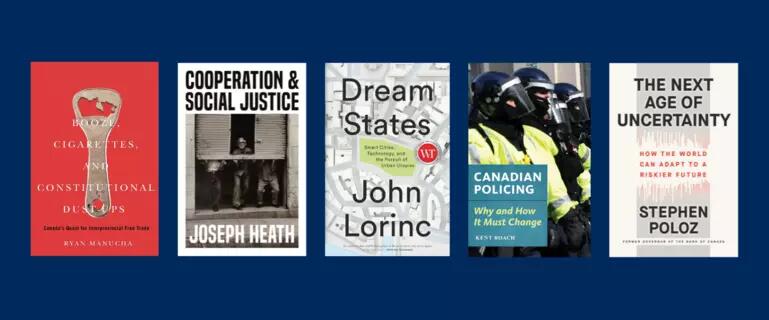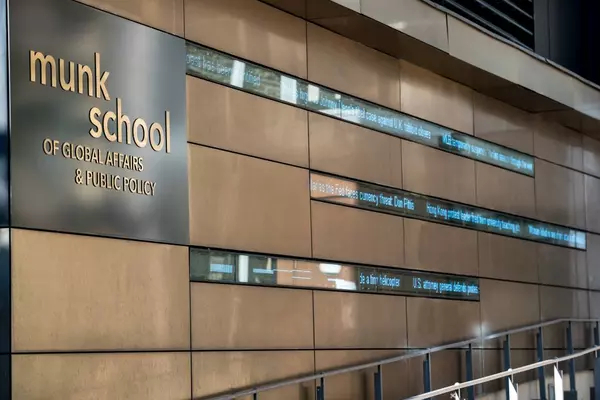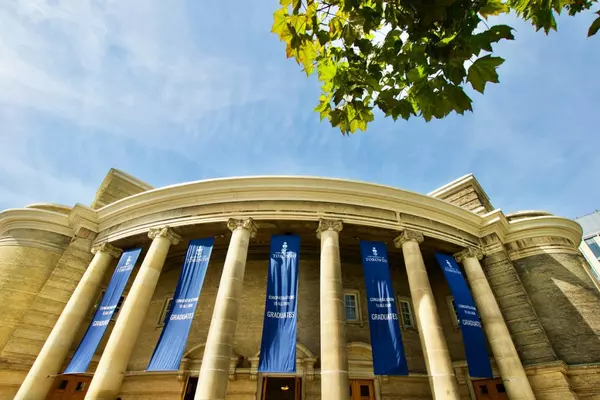Since 2021, the Donner Prize has partnered with selected Munk School students to have them each read one of the shortlisted books and engage in recorded conversations with the author. The students have also shared what qualities about each of the books might win the Donner Award for its author.

Cooperation and Social Justice by Joseph Heath, read by Vicky Zhou
Heath’s book, grounded in a pragmatic and philosophical approach, challenges a utopian concept of social justice but encourages us to think about the fundamentals. The author warns us that we might never find a satisfying answer to questions like “why people can’t just get along” or “why can't the society be fair,” and suggests that progress is possible through the scalability of cooperative structures and the feasibility of socialism.
This book should be awarded for its contribution not only to comprehension of social justice and cooperation, but also for its description of the future of public policymaking. Today’s public policymaking heavily involves debates around ideologies, but this book reminds us that it is important to root policymaking in pragmatism and reason.
The book does not shy away from difficult conversations and fleshes out modern ideas and arguments. In the last two chapters, Heath digs into contemporary policy challenges including immigration, border control, and race relations in the U.S. He engages critically with different sociological and philosophical approaches, giving the reader a truly expansive learning experience.
Vicky Zhou is a Master of Public Policy candidate at the Munk School and the author of Through My Eyes: exploring the world while being Asian. Her passion for social justice and community-building fueled her academic pursuit and professional work.
Dream States: Smart Cities, Technology, and the Pursuit of Urban Utopias by John Lorinc, read by Maria Cvetkova
The technology-driven era in which we now find ourselves continues to push boundaries, challenge conventions, and redefine the way we organize ourselves socially. For some, new age technology is ripe with promise, while for others, it is a path they dare not take. Using examples from world cities, Lorinc takes us through the evolution of city-building, from industrial society to the modern day “Smart City,” reminding us that technology has been the engine of city-building for much longer than we typically consider. Through a well-balanced and evidence-based appraisal of urban development, Lorinc invites readers to examine the role of technology in society without dimming the light on its promise. Using examples of inspiring innovations combined with cautionary tales of urban planning danger zones, Dream States is an essential guide to smart city -building in an era marked by climate change, socio-cultural and economic adaptation, and a rapidly changing technological landscape — all of which test the available range of outcome trade-offs.
Maria Cvetkova is a Master of Global Affairs student at the Munk School of Global Affairs & Public Policy. She is currently working at the Institute on Governance in the Science and Innovation Policy practice.


Booze, Cigarettes and Constitutional Dust-Ups: Canada’s Quest for Interprovincial Free Trade by Ryan Manucha, read by Joud Bayeh
Booze, Cigarettes, and Constitutional Dust-ups: Canada's Quest for Interprovincial Trade is an exceptional contribution to public policy literature. Manucha deviates from the traditional model of analysis and instead delivers a captivating narrative that evokes a wide range of emotions in readers, from sadness to hope.
One of the most outstanding features of the book is the author's masterful use of anecdotes that bring to life historical details and contextualize interprovincial trade regulations in Canada. By weaving together seemingly unrelated stories, the author builds a comprehensive picture of the intricacies of interprovincial trade in Canada. Furthermore, the book examines the historical discussion and jurisprudence surrounding Section 121 of the Canadian Constitution. The author's detailed analysis of this seemingly simple sentence reveals the complexities of constitutional interpretation and the need for a responsible understanding of context when expressing opinions.
Overall, its engaging narrative, insightful analysis, and thought-provoking content make it a standout work. It should be the win the Donner Prize not only because of its contributions to the understanding of interprovincial trade regulations, but because it offers a high-quality depiction of Canada’s identity as a nation.
Joud Bayeh is a second-year Master of Public Policy candidate at the Munk School of Global Affairs & Public Policy. He holds a Bachelor of Law and a Bachelor of Public Policy and has a vast experience in tax consulting. He currently works in the Ministry of Education of Ontario, in the Capital Program Branch.
The Next Age of Uncertainty: How the World Can Adapt to a Riskier Future by Stephen Poloz, read by Raafia Shahid
The Next Age of Uncertainty shines a light on five key public policy challenges facing Canada today, which are described as the five “tectonic forces”: population aging, technological progress, rising inequality, growing debt, and climate change. Stephen Poloz dives deep into each of these critical social issues, their dynamic interactions, and their implications for the future. The book highlights how the forces can interact to produce unexpected consequences, which he calls “black swan outcomes” – for example, how population growth and climate change create pressure on the world water supply. A master at simplifying complex relationships, Poloz artfully uses nuance when describing interrelations between processes like technological progress and trade liberalization.
Intertwined with personal anecdotes, as well as historical examples, The Next Age of Uncertainty should win the Donner Prize because it not only includes sound policy recommendations, but is very readable. Poloz draws on historical examples like the Victorian depression, as well as more recent events like the 2008 crash and the COVID-19 pandemic, to highlight different policy levers. He is adept at explaining complex economic concepts in simplistic, laymen terms, which makes complex ideas accessible for the non-technical reader. The book is a technical triumph, using statistical and economic theory to delve into social issues in an effort to prepare policy analysts for an uncertain future.
Raafia Shahid is a Master of Public Policy student at the Munk School of Global Affairs and Public Policy. She is currently interning at the Ontario Public Service (OPS) Treasury Board Secretariat (TBS) and has an interest in foreign policy.


Canadian Policing: Why and How It Must Change by Kent Roach, read by Ayesha Ali
In Canadian Policing: Why and How It Must Change, Kent Roach argues for Canadian policing reform. He suggests that integrating other services, like mental health, and allowing communities to self-police by redistributing duties among them, can assist in reducing over-policing and under-protection of vulnerable communities. These changes could also ensure police officers are able to focus on crime prevention in a way that incorporates constant learning and specialization. Roach’s argument for better governance of policing, specifically the RCMP, is an important acknowledgement to make at a time when police budgets are only growing, and the welfare state is in decline. Furthermore, in describing the current shortcomings and contradictions in policing today, Roach offers solutions for how we might rethink policing in Canada to reduce police-inflicted injustices and improve conditions of justice for all Canadians. One way which Roach does so is by pointing out the underfunding of Indigenous police services, despite their practices offering a model of how to work effectively with communities to guarantee safety and well-being. The book deserves to win the Donner Prize because it serves as a radical resource of guidance for reform action. By putting these insights into practice, we might finally be able to see an improvement in the relationship between police and the public.
Ayesha Ali is a student in the Master of Global Affairs program and is going into her second year. Her policy interests lie at the intersection of climate action, women's rights, and labour justice.



